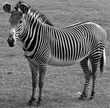Thursday, April 12. 2007
Images to vectors: Algorithm

- Find a number s that is not divided by the divisors of N=pq.
- Index vector, method 1:
- idx = mod(1:s:N*s, N);
- nil = find(idx==0); idx(nil)=N;
- Index vector, method 2 (preferred):
- idx = mod((1:s:N*s)-1, N)+1;
- imv(idx) = im(:);
- rim = reshape(imv(idx), p, q);
Let’s try this with our zebra. In my previous tries I simply took p=479 and q=480 to have gcd(479,480)=1, but 479 is a prime number and I therefore have no possibility to divide it by some step size. For GA I have to lay some kind of lattice over the image. So there is actually a second condition forbidding p and q to be prime. I take p=473 instead, it has 11 and 43 as divisors.
As one can see, N has many divisors, but e.g. 19 is not one of them. We can’t take e.g. 9 although it doesn’t occur either, as it is divided by 3, which is a divisor of N. Taking such a wrong step size will lead one back to the first pixel too early and one can never span the whole image.

Indeed looks like our zebra! ![]()
By the way, another try of comparing the FFT of the vector with the FFT2 of the image shows again that one cannot get the FFT2 by doing an FFT of the vector. This is because the line-patterns in the image might not be preserved under that transform, as neighboring pixels might not become neighbors in the resulting vector.
